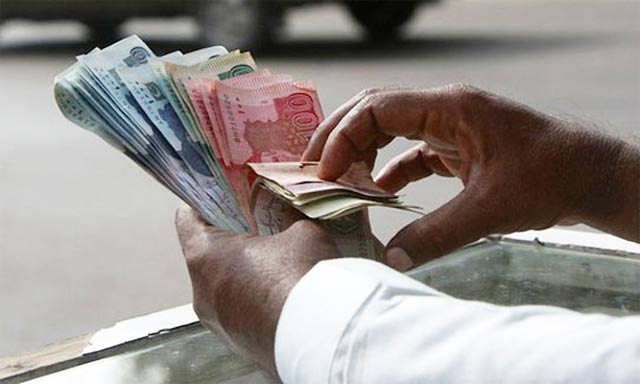A GDP number isn’t enough to measure true development
Many alternative measurements have not enjoyed the same acclaim

PHOTO: REUTERS
Robert Kennedy spoke these words in 1968 about the Gross Domestic Product (GDP), a few decades after the advent of GDP as a measurement tool of economic growth and performance. Despite such a critique by many quarters, GDP has become the most commonly used and an important economic indicator. Many alternative measurements – like happiness index, social well-being indices, human development index, and quality of life index – have not enjoyed the same acclaim as GDP.
Agriculture is backbone of Pakistan’s economy: experts
David Pilling has recently written a book, ‘The Growth Delusion’ that unearths many of the common flaws in the concept and measurement of GDP across the world. Pilling eloquently enunciates the historical debate on what needs to be included and what should not be included. The book sheds light on following challenges of counting on the GDP as a proxy for the economic performance of a country; the methodology to measure GDP has been evolving but it remains unable to capture the reality.
If production of tobaccos, drugs, and weapons of mass destruction and prostitution increases in a society (and it is included in the GDP), regardless of their social welfare impacts, they will increase the size of GDP. And some politicians and economists will be there to celebrate an increase in the size of the economy. The time spent and utility of breast feeding by mothers is not part of the GDP. Indeed, women are most neglected in GDP measurement throughout the history of its measurement.
Similarly, volunteer work, informal economy cannot become part of the GDP regardless of their impact on the economy. What cannot be costed and not measured is actually not part of the GDP. This also leads to serious flaws when we develop many economic indicators as ratios of GDP, such as expenditures on education or defense as percentage of GDP.
Economists would say yes; there are many deficiencies in the measurement of GDP. Yet, most of the politicians and economists would rely on the growth rate of GDP to make an argument in favour of or against any policy. It may be true that some economists may use this with caution as they do understand its flaws, but politicians really do not understand the calculations behind this number.
Such a grossly flawed usage of GDP does give wrong messages to people in a society. The more interesting case, for example, is the recent increase in GDP growth rate in the US during Trump Administration. Larry Summer, famous economist and former Treasury Secretary, has recently written an article in The Washington Post that this increase cannot be attributed to Trump’s policies. So, there has always been a controversy about what causes growth in the GDP and what does not.
Indeed, GDP is not the only culprit in the room. Overall, statistical foundations for policymaking are tinkered and fudged on the whims of those in power or other influential stakeholders. Such poorly constructed numbers and estimates, then fed into the decision-making process.
Morten Jerven’s book, Poor Numbers, explains the inaccuracy of data in most of the Sub-Saharan Africa and how it has been affecting development outcomes in the region. But leave Sub-Saharan Africa aside, Pilling quoted a survey in the UK in which only 10% people said that statistics released by the UK’s Office for National Statistics (ONS) were reliable.
If this is the situation in the UK, I wonder how people will react to the credibility of economics estimates and numbers by statistical agencies in Pakistan. There are four takeaways for Pakistan from this dialogue;
First, we will have to raise some suspicion on economic numbers. Particularly when economists tout the benefits of increasing growth rate of GDP and other such economic indicators, we should try to decipher these numbers first before moving onto a blind celebration of such achievements and policy prescriptions.
Recently, a leading expat Pakistani economist suggested to the government to improve the measurement of GDP and the sole purpose, as quoted in the media, was to show that size of the country’s economy was larger than what we reported currently. We need to be careful about such a prescription as it has nothing to do with the quality of life of people. No-doubt, there should be a continuous effort to improve measurement of economic indicators, but the objective of the exercise should be clear.
Govt efforts will address ‘people’s woes’
Secondly, Pakistan lacks micro-level and many other innovative data sets describing performance of human capital and business. That is why most of the research takes place by using aggregate datasets. Pakistan needs to improve autonomy and capacity of federal and provincial statistical agencies in the country. The use of modern technologies – such as big data, remote sensing, and artificial intelligence – need to be facilitated in Pakistan.
Third, it is unfortunate in Pakistan that when someone quotes a numeric number either in everyday life or in corridors of policymaking, he/she claims it as a fact. Many do not understand that a number itself is constructed based on some methodological biases. Actually, there is a need to differentiate between a number and an evidence/fact.
Four, the inconvenient truth is that everyone highlights a number that matches their argument and tries to bury the numbers that go against their argument. But it is of utmost importance that policymakers present an honest situation of economic performance instead of only projecting favourable economic indicators.
The writer is a public policy advisor and researcher with interest in public-sector governance, cities, and entrepreneurship
Published in The Express Tribune, January 29th, 2018.
Like Business on Facebook, follow @TribuneBiz on Twitter to stay informed and join in the conversation.



















COMMENTS
Comments are moderated and generally will be posted if they are on-topic and not abusive.
For more information, please see our Comments FAQ